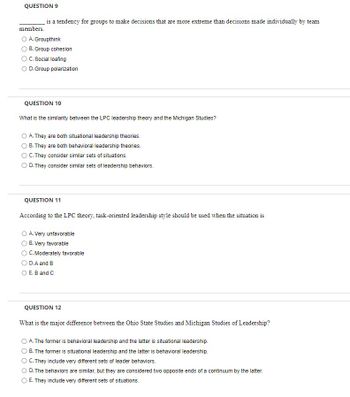
Understanding Business
12th Edition
ISBN: 9781259929434
Author: William Nickels
Publisher: McGraw-Hill Education
expand_more
expand_more
format_list_bulleted
Question

Transcribed Image Text:**Question 9**
_______ is a tendency for groups to make decisions that are more extreme than decisions made individually by team members.
- A. Groupthink
- B. Group cohesion
- C. Social loafing
- D. Group polarization
---
**Question 10**
What is the similarity between the LPC leadership theory and the Michigan Studies?
- A. They are both situational leadership theories.
- B. They are both behavioral leadership theories.
- C. They consider similar sets of situations.
- D. They consider similar sets of leadership behaviors.
---
**Question 11**
According to the LPC theory, task-oriented leadership style should be used when the situation is
- A. Very unfavorable
- B. Very favorable
- C. Moderately favorable
- D. A and B
- E. B and C
---
**Question 12**
What is the major difference between the Ohio State Studies and Michigan Studies of Leadership?
- A. The former is behavioral leadership and the latter is situational leadership.
- B. The former is situational leadership and the latter is behavioral leadership.
- C. They include very different sets of leader behaviors.
- D. The behaviors are similar, but they are considered two opposite ends of a continuum by the latter.
- E. They include very different sets of situations.
Expert Solution
This question has been solved!
Explore an expertly crafted, step-by-step solution for a thorough understanding of key concepts.
Step by stepSolved in 3 steps

Knowledge Booster
Similar questions
- According to the text hese skills are the most team leaders and lower level managers Question 8 options: technical skills human skills conceptual skillsarrow_forwardIt is more likely that extroverts may be drawn to a career in selling, due to their outgoing personality. On the other hand, science has proven introverts, who are reserved in nature, and tend to avoid social interactions may also do just as well in sales careers. Based on this, expand and explain how and why introverts can do just as well in a sales career.arrow_forwardEffective teams have confidence in themselves; they believe they can succeed. This is called team ________. congruence reflexivity bonding efficacy hubrisarrow_forward
- With respect to gender and leadership, which of the following has been revealed in the research? Group of answer choices Male leaders generally have more productive subordinates Female leaders generally have more productive subordinates Women are generally more democratic in their leadership style Men generally ask for more participation and input from subordinates than female leaders doarrow_forwardQ10arrow_forwardGroups operate on two levels, Tasks and Process. Explain the difference between the two and why both needs to be considered if groups are to be effective. List and explain the four human elements of group proces which are 1) Informal roles, 2) informal norms, 3) interpersonal conflict,4) leadership in decision makingarrow_forward
- Explain the following:functional teamTeams to solve problemsQuality circlesSelf-managed or self-directed work teamcross-functional teamsvirtual team make a conclusion about the topicarrow_forwardMary Parker Follett would advise the group to: -Find a way to accommodate Onyealisi in his desire to avoid accountability to the group -Develop a system that resolves the group's conflicts through competition -Seek a more integrative approach, and find ways to address the conflict through collaboration -Continue to avoid the issue, but only until it begins to truly impact group performancearrow_forwardpresentation on why cricket is the best sport in the world using monroe's motivated sequencearrow_forward
arrow_back_ios
arrow_forward_ios
Recommended textbooks for you
 Understanding BusinessManagementISBN:9781259929434Author:William NickelsPublisher:McGraw-Hill Education
Understanding BusinessManagementISBN:9781259929434Author:William NickelsPublisher:McGraw-Hill Education Management (14th Edition)ManagementISBN:9780134527604Author:Stephen P. Robbins, Mary A. CoulterPublisher:PEARSON
Management (14th Edition)ManagementISBN:9780134527604Author:Stephen P. Robbins, Mary A. CoulterPublisher:PEARSON Spreadsheet Modeling & Decision Analysis: A Pract...ManagementISBN:9781305947412Author:Cliff RagsdalePublisher:Cengage Learning
Spreadsheet Modeling & Decision Analysis: A Pract...ManagementISBN:9781305947412Author:Cliff RagsdalePublisher:Cengage Learning Management Information Systems: Managing The Digi...ManagementISBN:9780135191798Author:Kenneth C. Laudon, Jane P. LaudonPublisher:PEARSON
Management Information Systems: Managing The Digi...ManagementISBN:9780135191798Author:Kenneth C. Laudon, Jane P. LaudonPublisher:PEARSON Business Essentials (12th Edition) (What's New in...ManagementISBN:9780134728391Author:Ronald J. Ebert, Ricky W. GriffinPublisher:PEARSON
Business Essentials (12th Edition) (What's New in...ManagementISBN:9780134728391Author:Ronald J. Ebert, Ricky W. GriffinPublisher:PEARSON Fundamentals of Management (10th Edition)ManagementISBN:9780134237473Author:Stephen P. Robbins, Mary A. Coulter, David A. De CenzoPublisher:PEARSON
Fundamentals of Management (10th Edition)ManagementISBN:9780134237473Author:Stephen P. Robbins, Mary A. Coulter, David A. De CenzoPublisher:PEARSON

Understanding Business
Management
ISBN:9781259929434
Author:William Nickels
Publisher:McGraw-Hill Education

Management (14th Edition)
Management
ISBN:9780134527604
Author:Stephen P. Robbins, Mary A. Coulter
Publisher:PEARSON

Spreadsheet Modeling & Decision Analysis: A Pract...
Management
ISBN:9781305947412
Author:Cliff Ragsdale
Publisher:Cengage Learning

Management Information Systems: Managing The Digi...
Management
ISBN:9780135191798
Author:Kenneth C. Laudon, Jane P. Laudon
Publisher:PEARSON

Business Essentials (12th Edition) (What's New in...
Management
ISBN:9780134728391
Author:Ronald J. Ebert, Ricky W. Griffin
Publisher:PEARSON

Fundamentals of Management (10th Edition)
Management
ISBN:9780134237473
Author:Stephen P. Robbins, Mary A. Coulter, David A. De Cenzo
Publisher:PEARSON